- Home
- Franklin W. Dixon
The Secret Panel Page 3
The Secret Panel Read online
Page 3
“You have another big day ahead of you,” Mrs. Hardy said. “Better go to bed early.”
Frank and Joe followed her advice, and their mother also retired at ten o’clock. It was past midnight that she was awakened by the doorbell.
She called out to the boys, who had heard it too and had come from their room. “I’ll see who it is,” Joe offered, putting on his robe and bedroom slippers.
As he spoke, the bell rang again. This time the caller kept a finger on the button. Frank and Joe hurried downstairs.
Mrs. Hardy was right behind them and warned the boys to be cautious. Before opening the door, Frank snapped on the porch light and looked out the glass panel.
Joe peered over his shoulder. “Do you know her?” he asked his brother, pointing to the visitor.
Frank shook his head.
Outside stood a strange woman, fidgeting nervously. She wore a faded pink hat over her short blond hair. A black coat had been thrown carelessly over her slim shoulders. As Frank slowly opened the door, she pushed it in excitedly.
“Where’s Mr. Hardy?” she cried in a shrill, hysterical voice. “I’ve got to see him right away!”
CHAPTER IV
The Traffic Signal Clue
THE distraught woman continued frantically, “I’ve got to see Mr. Hardy. Right away. Where is he?”
Mrs. Hardy turned on a light in the living room and led the visitor to a chair.
“Please sit down,” she said kindly. “Mr. Hardy isn’t here at the moment, but perhaps we can help you.”
“Oh, no! Only Mr. Hardy can help me,” the stranger cried. “He’s got to help my Lenny. I’ll spend every cent of my savings if I have to.”
“Lenny is your son?” Frank asked.
“Yes. He’s a good boy. In all his eighteen years he never did wrong.”
“Where is he?” Joe inquired.
“That’s just it. I don’t know.”
“Have you been to the police?”
The woman gave a shriek. “Police? I should say not! They wouldn’t understand. They might put Lenny in jail. That never happened to a Stryker and it’s not gonna happen now!”
As the woman paused for breath, Frank inquired if she was Mrs. Stryker. The caller nodded, adding that she was a widow and Lenny was her only child.
“I’m sorry you’re in trouble,” said Mrs. Hardy. “When Mr. Hardy returns tomorrow—”
The caller wrung her hands. “Tomorrow? I was hoping he could do something tonight. You see, I got a message from Lenny just a little while ago, and something ought to be done right away. He said the gang nearly got caught, and he’d been shot in the leg.”
“Shot!” chorused the three Hardys, and Frank added, “What Lenny needs is a doctor.”
“He needs a detective too!” Mrs. Stryker moaned. She did not know where Lenny was, and was afraid he would not receive proper care. “That’s why I want Mr. Hardy to find him.”
“Did your son give you any hint about where he is?” Joe asked eagerly.
“I think so. I’ll tell you all I know.”
The boys leaned forward in their chairs, waiting intently for the woman’s story. She told them her son had acted mysteriously lately, and that she suspected he had fallen into bad company. He had gone out earlier that night. Then, at eleven-thirty he had telephoned, saying he had been shot.
“And you don’t have any idea whom he went out with?” Frank inquired.
“No. But Lenny mumbled some funny words on the phone,” Mrs. Stryker explained. “Two of them sounded like ‘secret panel.’ Then the connection was cut off.”
Secret panel!
Frank and Joe looked at each other. It was a clue, all right, but where could one start to investigate? Though the boys quizzed Mrs. Stryker for fifteen minutes, she could shed no more light on the subject. At last she stood up to go, disappointed because the Hardys could give her no immediate help.
“But you promise to tell Mr. Hardy about it the minute he comes in tomorrow?” she begged.
“Yes, we will,” Frank assured her.
The woman wrote down her address and went out into the night.
“Poor soul,” Mrs. Hardy said, and all three went upstairs and back to bed.
Fenton Hardy arrived home before breakfast the next morning and listened attentively to the story of Lenny Stryker. His face grew grave.
“It seems this boy has really gotten himself mixed up with a rough crowd.”
“You sound as if you know who they are, Dad,” Frank remarked.
“I have a suspicion,” Mr. Hardy began. “Come on. I’ll tell you about it over breakfast.”
As the family sat down at the dining-room table, they heard the screech of brakes and the slam of a car door. Moments later the bell rang.
Frank answered it and was surprised to see their father’s close friend Dr. William Gardner.
“Is your Dad home?” Dr. Gardner asked quickly. He was middle-aged and seemed very agitated. As Mr. Hardy came into the hall, he went on, “I’ve just talked to the police, Fenton, and Chief Collig thought you ought to know, too, about what happened.”
“Suppose we go to my study, Bill.”
The detective led the way upstairs and motioned Frank and Joe to follow.
“Thank you,” Dr. Gardner said and sat down in a chair. “My troubles are over; at least I hope they are. But something must be done to punish the culprits.” He lowered his voice. “Last night I was kidnapped!”
“What!” Frank exclaimed.
“Yes,” the doctor went on. “I was leaving the hospital about ten-thirty when two men came up and ordered me into a car at gunpoint. They promised I wouldn’t be harmed if I did as I was told.”
“What did they look like?” Joe inquired.
“I have no idea,” Dr. Gardner replied. “Everything happened too fast. I really didn’t notice.”
He told how he had been blindfolded, then driven some place in the car, forced to get out and enter a building. When the blindfold was removed, he found himself in a room with several masked men.
“They were taking no chances,” remarked Mr. Hardy.
“Right. Even the patient I was to treat had his face covered,” Dr. Gardner went on.
“Where was the bullet?” Frank asked excitedly.
“In his right leg.”
The Hardys exchanged quick glances. Could the patient have been Lenny Stryker? To their questions the physician replied that the man’s leg was the only part of his body he had seen uncovered, and that there was no distinguishing mark on it which could be used as a means of identification.
“All I can say is that he’s very young, and has a lot of grit. He didn’t cry out once!”
“What did the room look like, Bill?” Mr. Hardy questioned. “Would you say you got into it through a panel?”
“I could see very little in the room. It was dark except around the patient. One of the men held a lamp so I could work,” Dr. Gardner replied. “It seemed as if the room had no windows, or if there were any, they were well covered. As for the secret panel, I really couldn’t say.”
“Tell me about how long you spent riding to and from the place, and if you noticed anything unusual on the way,” Mr. Hardy requested.
Dr. Gardner was thoughtful for a minute. “I don’t know how accurate I may be,” he mused, “but I’d say we went about thirty miles an hour. One thing does come to mind. About ten minutes before reaching the place, we stopped briefly.”
“What for?”
“A traffic light, I think. I noticed a humming sound as we waited—almost a singing noise. It could have been the signal. Sometimes they do hum, you know. It was the same on the trip back to the hospital, where they finally let me go. Is this information at all helpful?”
“It’s a good clue,” Mr. Hardy said enthusiastically. “Suppose you follow it, boys.”
“All right,” Joe answered. “First thing this morning!”
Dr. Gardner wished the Hardys luck on the search.
After he had gone, Mr. Hardy called Chief Collig, who told him that he had advised all the hospitals in the area to warn their staffs to be on guard. The police chief said he would inform the Hardys the minute he heard of any new development. Then the detective turned to his sons.
“Stop by Mrs. Stryker’s house sometime today and tell her I’ll try to find Lenny,” he said. “It looks as if he may be involved with the same gang I’m hunting for.”
Frank and Joe stared in surprise.
“There’s a wanted criminal by the name of Whitey Masco, who’s been in hiding for a long time,” Mr. Hardy went on. “He was involved in some bank robberies and is suspected to be the mastermind of a big gang.”
“What makes you think Lenny has anything to do with him?”
“Last night another appliance warehouse was broken into. Just as the thieves were leaving, the watchman, whom they had knocked out earlier, regained consciousness and saw someone running away. He fired a shot, and it’s just possible he hit Lenny Stryker.”
“Why didn’t the thieves take the guard’s gun?”
Mr. Hardy smiled. “Maybe they gave that job to Lenny and he couldn’t handle it. Well, we’d better eat breakfast and start on our projects.”
He led the way back to the dining room. “I have an appointment with an FBI man, and you have—”
Just then someone slammed the kitchen screen door, and a cheery voice called out, “Hello.”
It was Chet. He sniffed the air, looked at a platter of bacon and eggs, and grinned.
“Hi, Chet. You’re just in time,” said Joe. “I bet you haven’t had a thing to eat for an hour.”
Chet pretended not to hear the gibe. He walked into the dining room and drew up a chair.
“Good morning, everyone,” he said brightly.
As the family greeted him, he went on, “I’ve had my breakfast, but I could eat one of those bananas.” He reached into the fruit basket. Everyone laughed.
The Hardys were just finishing breakfast when the doorbell rang. Frank went to answer it. To his surprise he found his Aunt Gertrude standing outside.
“Well, let me in!” she said, giving him a quick kiss before he picked up her suitcase. “Where is everybody?”
Without waiting for an answer, the unpredictable Miss Hardy went on, “They’re still at the breakfast table, I’ll bet!” She strode into the dining room and greeted the others.
“Laura, how can you stand to have meals at all hours? Well, things will be different now that I’m here!”
Frank, Joe, and even Chet knew this only too well. Aunt Gertrude, though she loved her famous brother’s family, always made a point of trying to improve their habits.
The tall, energetic spinster ruled with an iron fist, at least on the surface, and the boys had learned not to argue with her.
“Hello, Gertrude,” Mrs. Hardy said with a smile as her husband got up to greet his sister. “We didn’t expect you home until tomorrow. Tell us, how did you get here? We would have come for you if we had known your plans.”
Miss Hardy, who had been away for two weeks visiting friends, said that she had decided to return earlier than planned.
“I called a couple of times from the airport, but couldn’t get you. Your telephone was forever busy. So I took a taxi. Thought I’d surprise you.”
“Well, let me help you unpack.”
Joe picked up his aunt’s suitcase and followed the two women to Aunt Gertrude’s room, when the telephone rang. Frank answered.
It was Ben Whittaker, the locksmith. “Can you come over right away?” He sounded distressed.
“What’s up?” Frank wanted to know.
“I’ll tell you when you get here. Please hurry!”
“Okay.” Frank hung up, and when Joe came downstairs, told him of the strange conversation.
“Well, what are we waiting for? Let’s go!” Joe said.
Briefly, Frank explained their errand to his parents. Chet had not eaten all he would have liked to, but he thought it wise to leave with his pals. Any moment now Miss Hardy might start trying to reform his eating habits!
The three boys went outside and scrambled into the convertible. A moment later they were on their way. When they arrived at Mr. Whittaker’s shop, they found the locksmith in a state of extreme anxiety.
“Mike Batton hasn’t come back. I phoned his house, and they told me that he’s moved out. Nobody knows where he’s gone!”
CHAPTER V
A Futile Search
FRANK and Joe listened to the shopkeeper’s surprising announcement and were startled when he continued:
“Even worse, I’ve discovered that all the money we took in yesterday is missing from the cash register!”
“Oh, oh,” Joe said. “Looks as if Batton is a thief, all right.”
“Yes,” the locksmith went on. “I’ve notified the police. But the thing I’m most upset about is that my reputation is at stake. I’ve been in business for forty years and nobody ever had any reason to question my integrity before. And it’s all Mike Batton’s doing!”
“What happened?” Chet asked.
“Mrs. Eccles phoned a few minutes ago and wants her money back. Furthermore, Batton changed another lock yesterday, for the Petersons, and they report that a valuable bracelet and a hundred dollars in cash are missing!”
Frank suggested that surely his customers would realize he was not responsible for the loss of their valuables. To take the worried man’s mind off his troubles, Frank asked him if he knew John Mead, who had owned the mansion that had no locks.
“I did,” Mr. Whittaker replied. “Nice man. That was a terrible accident. He and the chauffeur were killed instantly.”
“Please tell us about him,” Joe said.
“Well, at one time he was a partner in a big hardware concern in New York,” the locksmith revealed. “He once told me he vowed to build himself a house without a single lock or keyhole when he retired. He was so tired of looking at locks he never wanted to see another one in his whole life!”
Whittaker went on to say that he had spent several evenings at the Mead mansion with the hardware manufacturer, discussing locksmithing problems. Mead had been extremely clever and inventive, but a little eccentric. He had never mentioned having any family, and no will had been found after his death. So far as Whittaker knew, no one had claimed the estate.
“Don’t any of the doors at the mansion have locks on them?” Chet asked in awe.
“Oh, yes,” Mr. Whittaker said, smiling. “They all do, but they’re cleverly concealed.”
“Do you know where?”
“No. He installed them himself.”
After thanking the locksmith for the information and agreeing to do what they could to help in the search for Mike Batton, the boys left the shop.
“Now what?” Chet asked.
“We could go over to Mrs. Stryker and see if she’s heard any more from Lenny,” Frank suggested.
“Good idea,” Joe agreed. “Want to come along, Chet?”
“Sure do.”
Frank drove to a shabby, run-down section of Bayport. They located the Strykers’ apartment building, and Chet stayed in the car while Frank and Joe went inside. They found the place to be clean and tidy. Lenny’s mother greeted them.
“Have you any news of my boy?” she asked, her eyes lighting up hopefully.
Frank shook his head. “I’m afraid not. We do have a clue, though. A doctor came to our house this morning and said he had been kidnapped last night to take care of a young man who had been shot in the leg.”
“It must have been Lenny!” the woman cried out. “Where is he? I’ll go at once.”
“Dr. Gardner couldn’t tell us where he had been taken because he was blindfolded. However, he gave us a good clue. Don’t worry, Mrs. Stryker. The doctor said the boy he treated was all right. If it’s Lenny, we’ll find him.”
“Does the name Whitey Masco mean anything to you?” Joe asked.
The woman shook her
head. “Nothing. Who is he?”
“Just a name that came up. Probably has nothing to do with Lenny,” Frank assured her. Then the boys left.
When they reached the car, Chet was not in it. They spied him at a nearby street intersection. He was looking up intently at the traffic light, his head cocked to one side. When he saw Frank and Joe, he ran toward them.
“Well, that one doesn’t sing,” Chet declared as he got into the car.
“Let’s investigate some others,” Joe said.
The three boys drove without success from one traffic light to another. Just as they were about to stop for the day, Frank cried, “Listen!”
A traffic signal hung high above the pavement at the intersection of two wide streets. A distinct humming sound came from it as the automatic timer changed the lights.
“Now we’re getting somewhere!” Joe cried excitedly. “Dr. Gardner said he was driven for about ten minutes from a singing signal. Which direction shall we take first?”
It was decided to go north at the rate of thirty miles an hour, as the physician had estimated.
“Stop!” Joe called.
Chet’s face broke into a broad smile. They were directly in front of a roadside restaurant.
“Well, fellows,” he said, “you two can go hunting for kidnapping gangsters and secret panels all you like. I’m going to eat!”
A sign advertising lunches and dinners swung from a post in front of a small white cottage. Flowered curtains hung at the windows and rose-bushes were in bloom along the walk.
“Doesn’t look like a hideout for thieves,” said Joe, disappointed.
Frank pointed out that the attractive front might be only a cover for some sinister doings inside. He insisted they find out, adding:
“Guess we all could eat, anyway. Let’s go in. I’ll telephone and tell Mother we won’t be home for lunch.”
The woman who owned the restaurant prepared a delicious meal for the boys, while they looked around. They saw the entire cottage, even the basement, for the owner proudly showed them her preserve closet. There was nothing the least bit suspicious about the house.

 The Great Pumpkin Smash
The Great Pumpkin Smash Who Let the Frogs Out?
Who Let the Frogs Out? Return to Black Bear Mountain
Return to Black Bear Mountain A Treacherous Tide
A Treacherous Tide Bug-Napped
Bug-Napped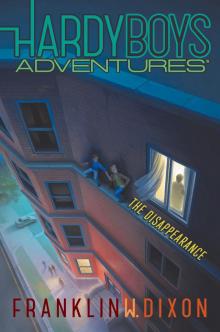 The Disappearance
The Disappearance Sea Life Secrets
Sea Life Secrets The Mystery of the Chinese Junk
The Mystery of the Chinese Junk A Skateboard Cat-astrophe
A Skateboard Cat-astrophe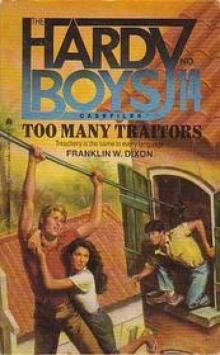 Too Many Traitors
Too Many Traitors Galaxy X
Galaxy X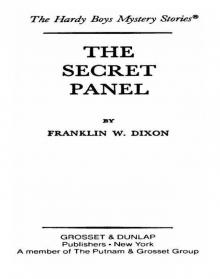 The Secret Panel
The Secret Panel The Secret of Wildcat Swamp
The Secret of Wildcat Swamp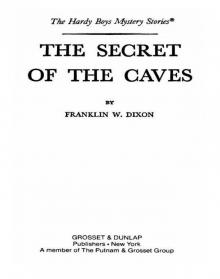 The Secret of the Caves
The Secret of the Caves The Caribbean Cruise Caper
The Caribbean Cruise Caper Without a Trace
Without a Trace The Mystery of the Spiral Bridge
The Mystery of the Spiral Bridge Movie Menace
Movie Menace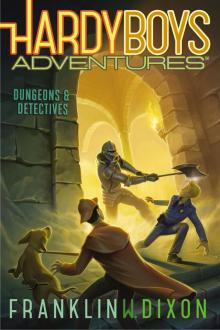 Dungeons & Detectives
Dungeons & Detectives Water-Ski Wipeout
Water-Ski Wipeout The Case of the Psychic's Vision
The Case of the Psychic's Vision X-plosion
X-plosion Deathgame
Deathgame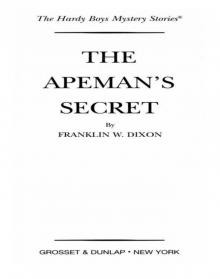 The Apeman's Secret
The Apeman's Secret A Will to Survive
A Will to Survive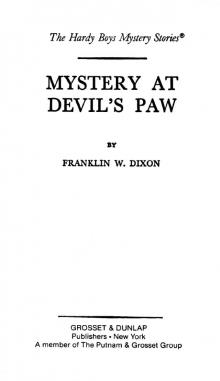 Mystery at Devil's Paw
Mystery at Devil's Paw Blood Money
Blood Money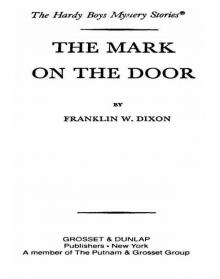 The Mark on the Door
The Mark on the Door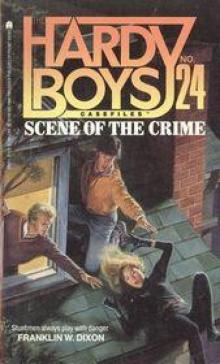 Scene of the Crime
Scene of the Crime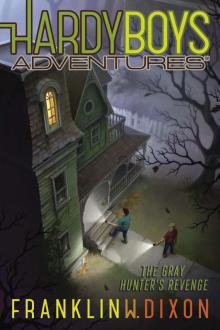 The Gray Hunter's Revenge
The Gray Hunter's Revenge Stolen Identity
Stolen Identity The Mummy's Curse
The Mummy's Curse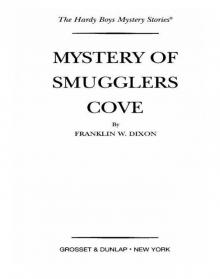 Mystery of Smugglers Cove
Mystery of Smugglers Cove Diplomatic Deceit
Diplomatic Deceit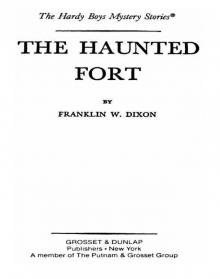 The Haunted Fort
The Haunted Fort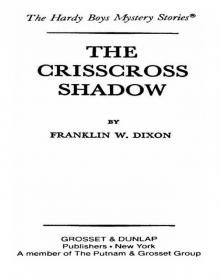 The Crisscross Shadow
The Crisscross Shadow Secret of the Red Arrow
Secret of the Red Arrow Trial and Terror
Trial and Terror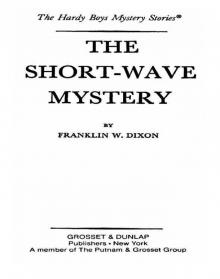 The Short-Wave Mystery
The Short-Wave Mystery The Spy That Never Lies
The Spy That Never Lies Operation: Survival
Operation: Survival Deception on the Set
Deception on the Set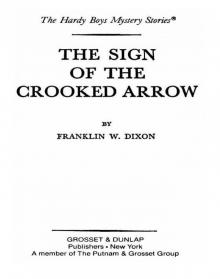 The Sign of the Crooked Arrow
The Sign of the Crooked Arrow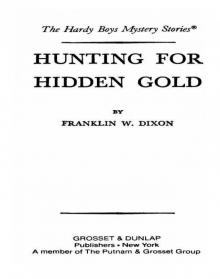 Hunting for Hidden Gold
Hunting for Hidden Gold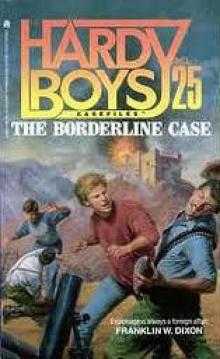 Disaster for Hire
Disaster for Hire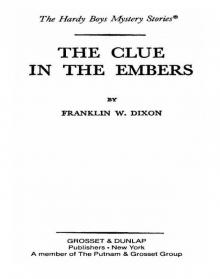 The Clue in the Embers
The Clue in the Embers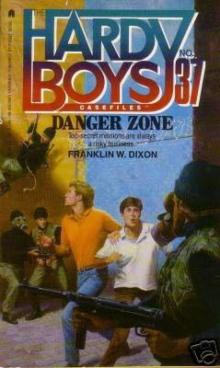 Danger Zone
Danger Zone The Hidden Harbor Mystery
The Hidden Harbor Mystery Eye on Crime
Eye on Crime A Game Called Chaos
A Game Called Chaos The Bicycle Thief
The Bicycle Thief The Missing Playbook
The Missing Playbook Survival Run
Survival Run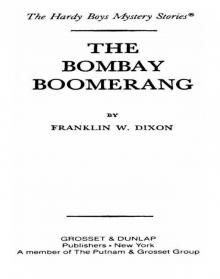 The Bombay Boomerang
The Bombay Boomerang Mystery of the Samurai Sword
Mystery of the Samurai Sword Burned
Burned Death and Diamonds
Death and Diamonds Murder at the Mall
Murder at the Mall The Prime-Time Crime
The Prime-Time Crime Hide-and-Sneak
Hide-and-Sneak Training for Trouble
Training for Trouble Trouble in Paradise
Trouble in Paradise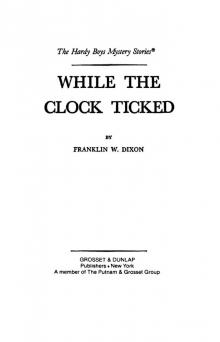 While the Clock Ticked
While the Clock Ticked The Alaskan Adventure
The Alaskan Adventure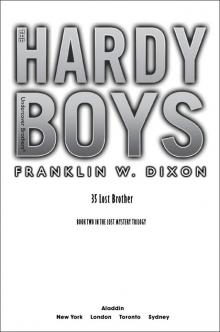 The Lost Brother
The Lost Brother Tunnel of Secrets
Tunnel of Secrets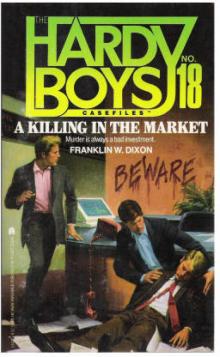 A Killing in the Market
A Killing in the Market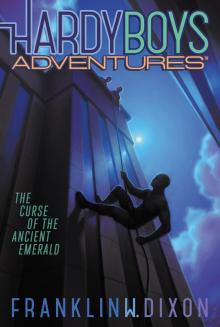 The Curse of the Ancient Emerald
The Curse of the Ancient Emerald The Arctic Patrol Mystery
The Arctic Patrol Mystery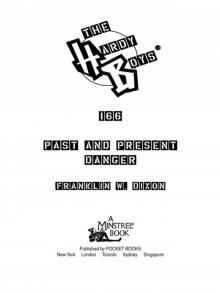 Past and Present Danger
Past and Present Danger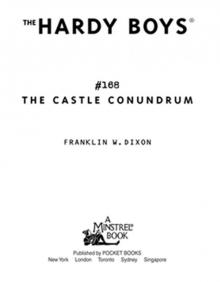 The Castle Conundrum (Hardy Boys)
The Castle Conundrum (Hardy Boys) Farming Fear
Farming Fear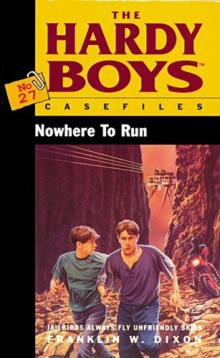 Nowhere to Run
Nowhere to Run The Secret of the Soldier's Gold
The Secret of the Soldier's Gold Danger on Vampire Trail
Danger on Vampire Trail The Lure of the Italian Treasure
The Lure of the Italian Treasure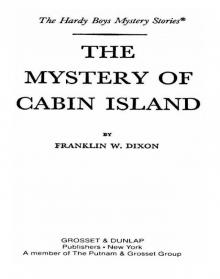 The Mystery of Cabin Island
The Mystery of Cabin Island Darkness Falls
Darkness Falls Night of the Werewolf
Night of the Werewolf Danger in the Extreme
Danger in the Extreme The Lazarus Plot
The Lazarus Plot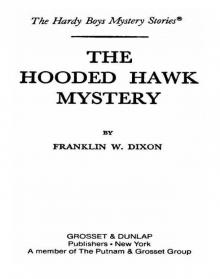 The Hooded Hawk Mystery
The Hooded Hawk Mystery Double Trouble
Double Trouble Forever Lost
Forever Lost Pushed
Pushed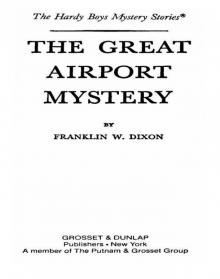 The Great Airport Mystery
The Great Airport Mystery The Hunt for Four Brothers
The Hunt for Four Brothers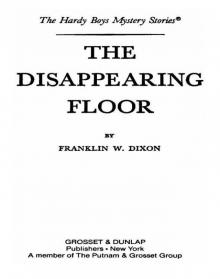 The Disappearing Floor
The Disappearing Floor Motocross Madness
Motocross Madness Foul Play
Foul Play High-Speed Showdown
High-Speed Showdown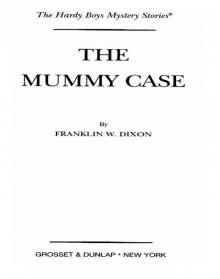 The Mummy Case
The Mummy Case The Firebird Rocket
The Firebird Rocket Trouble in Warp Space
Trouble in Warp Space Ship of Secrets
Ship of Secrets Line of Fire
Line of Fire The Clue of the Broken Blade
The Clue of the Broken Blade Medieval Upheaval
Medieval Upheaval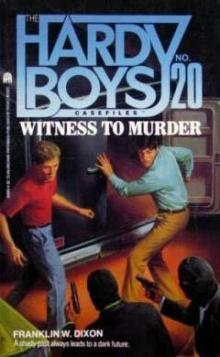 Witness to Murder
Witness to Murder The Giant Rat of Sumatra
The Giant Rat of Sumatra Attack of the Bayport Beast
Attack of the Bayport Beast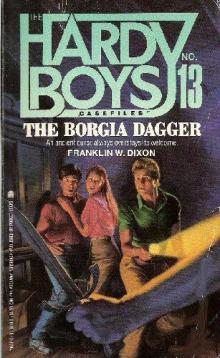 The Borgia Dagger
The Borgia Dagger Scavenger Hunt Heist
Scavenger Hunt Heist No Way Out
No Way Out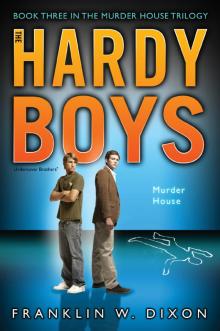 Murder House
Murder House The X-Factor
The X-Factor The Desert Thieves
The Desert Thieves Mystery of the Phantom Heist
Mystery of the Phantom Heist The Battle of Bayport
The Battle of Bayport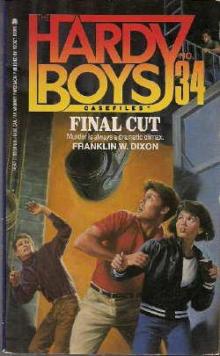 Final Cut
Final Cut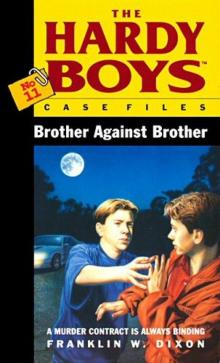 Brother Against Brother
Brother Against Brother Private Killer
Private Killer The Mystery of the Black Rhino
The Mystery of the Black Rhino Feeding Frenzy
Feeding Frenzy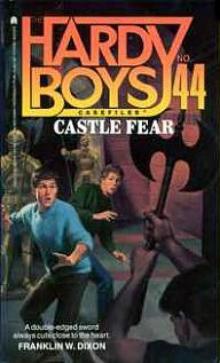 Castle Fear
Castle Fear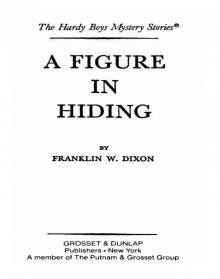 A Figure in Hiding
A Figure in Hiding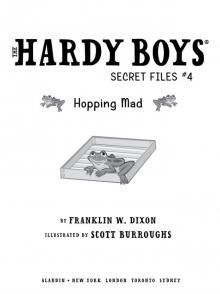 Hopping Mad
Hopping Mad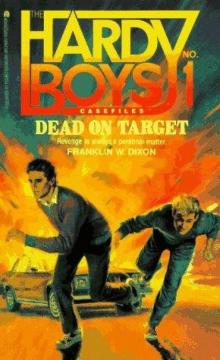 Dead on Target
Dead on Target Skin and Bones
Skin and Bones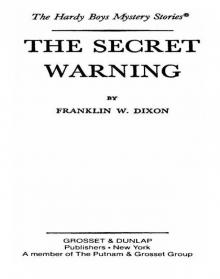 The Secret Warning
The Secret Warning Flesh and Blood
Flesh and Blood The Shattered Helmet
The Shattered Helmet Boardwalk Bust
Boardwalk Bust Terror at High Tide
Terror at High Tide In Plane Sight
In Plane Sight The London Deception
The London Deception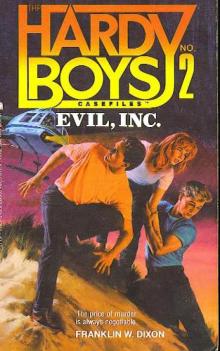 Evil, Inc.
Evil, Inc. Deprivation House
Deprivation House The Mystery of the Aztec Warrior
The Mystery of the Aztec Warrior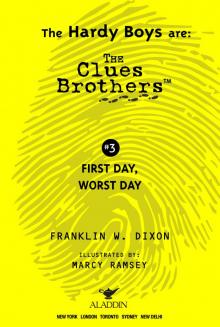 First Day, Worst Day
First Day, Worst Day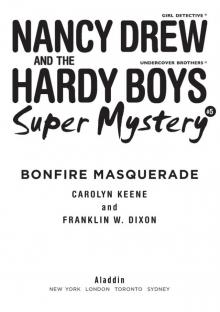 Bonfire Masquerade
Bonfire Masquerade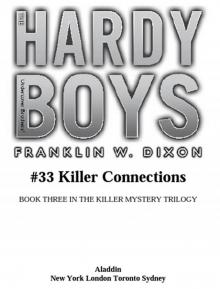 Killer Connections
Killer Connections Strategic Moves
Strategic Moves Warehouse Rumble
Warehouse Rumble The Chase for the Mystery Twister
The Chase for the Mystery Twister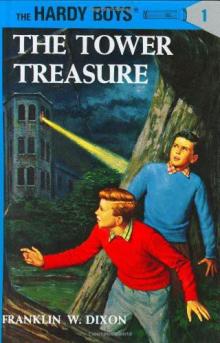 The Tower Treasure thb-1
The Tower Treasure thb-1 The Children of the Lost
The Children of the Lost The Last Laugh
The Last Laugh Trick-or-Trouble
Trick-or-Trouble Perfect Getaway
Perfect Getaway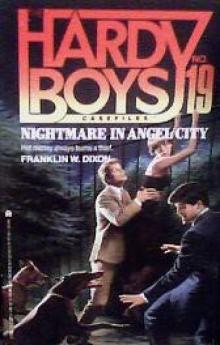 Nightmare in Angel City
Nightmare in Angel City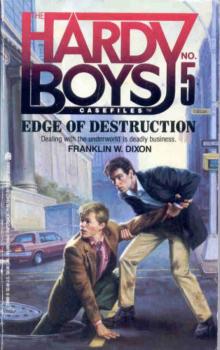 Edge of Destruction
Edge of Destruction Fright Wave
Fright Wave The Jungle Pyramid
The Jungle Pyramid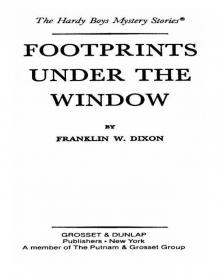 Footprints Under the Window
Footprints Under the Window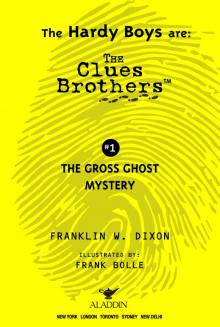 The Gross Ghost Mystery
The Gross Ghost Mystery A Monster of a Mystery
A Monster of a Mystery House Arrest
House Arrest Mystery of the Desert Giant
Mystery of the Desert Giant Talent Show Tricks
Talent Show Tricks The Sting of the Scorpion
The Sting of the Scorpion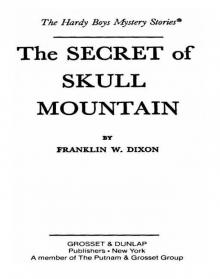 The Secret of Skull Mountain
The Secret of Skull Mountain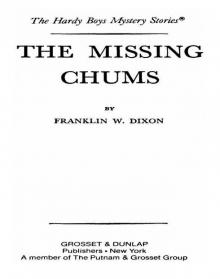 The Missing Chums
The Missing Chums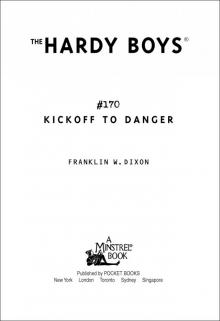 Kickoff to Danger
Kickoff to Danger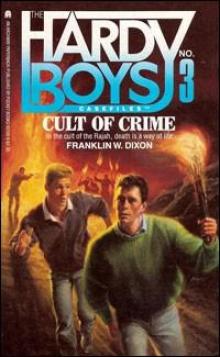 Cult of Crime
Cult of Crime Running on Fumes
Running on Fumes Martial Law
Martial Law The Pentagon Spy
The Pentagon Spy Hazed
Hazed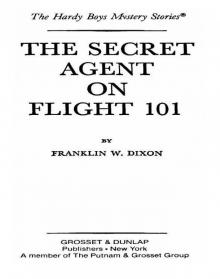 The Secret Agent on Flight 101
The Secret Agent on Flight 101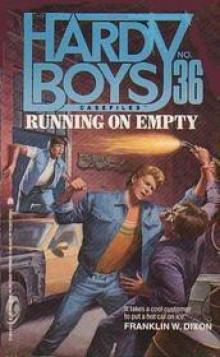 Running on Empty
Running on Empty Top Ten Ways to Die
Top Ten Ways to Die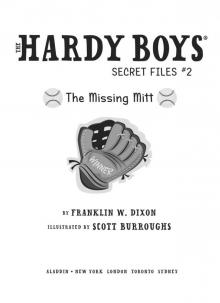 The Missing Mitt
The Missing Mitt The Melted Coins
The Melted Coins The Rocky Road to Revenge
The Rocky Road to Revenge The Masked Monkey
The Masked Monkey Lost in Gator Swamp
Lost in Gator Swamp Extreme Danger
Extreme Danger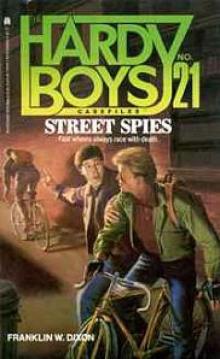 Street Spies
Street Spies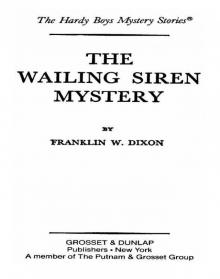 The Wailing Siren Mystery
The Wailing Siren Mystery The Dangerous Transmission
The Dangerous Transmission Hurricane Joe
Hurricane Joe The Crisscross Crime
The Crisscross Crime Mystery of the Whale Tattoo
Mystery of the Whale Tattoo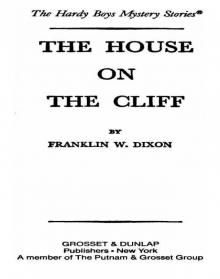 The House on the Cliff
The House on the Cliff Camping Chaos
Camping Chaos Ghost of a Chance
Ghost of a Chance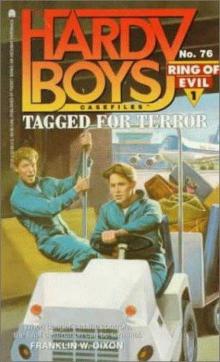 Tagged for Terror
Tagged for Terror Thrill Ride
Thrill Ride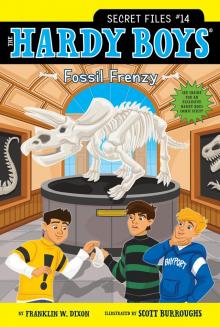 Fossil Frenzy
Fossil Frenzy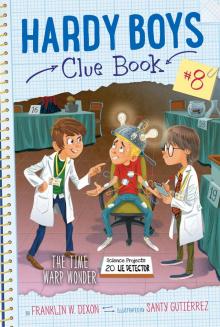 The Time Warp Wonder
The Time Warp Wonder Ghost Stories
Ghost Stories Speed Times Five
Speed Times Five What Happened at Midnight
What Happened at Midnight Three-Ring Terror
Three-Ring Terror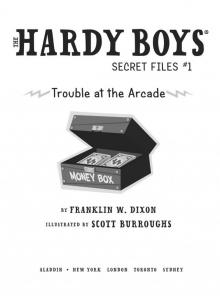 Trouble at the Arcade
Trouble at the Arcade The Clue of the Hissing Serpent
The Clue of the Hissing Serpent Trouble in the Pipeline
Trouble in the Pipeline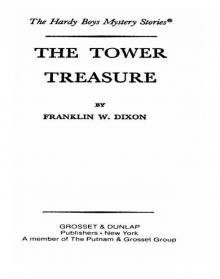 The Tower Treasure
The Tower Treasure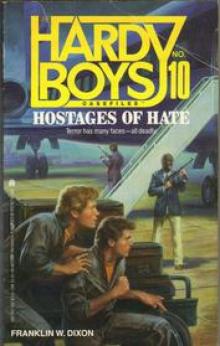 Hostages of Hate
Hostages of Hate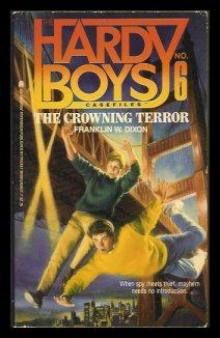 The Crowning Terror
The Crowning Terror Daredevils
Daredevils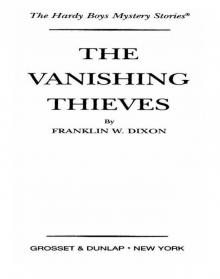 The Vanishing Thieves
The Vanishing Thieves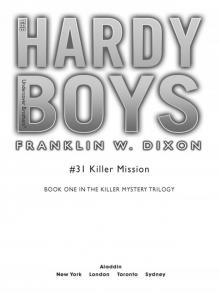 Killer Mission
Killer Mission The Mark of the Blue Tattoo
The Mark of the Blue Tattoo The Witchmaster's Key
The Witchmaster's Key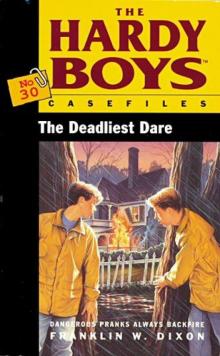 The Deadliest Dare
The Deadliest Dare Peril at Granite Peak
Peril at Granite Peak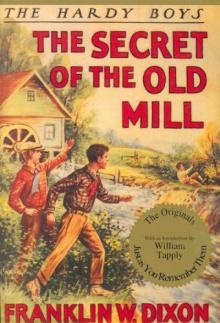 The Secret Of The Old Mill thb-3
The Secret Of The Old Mill thb-3 Rocky Road
Rocky Road The Demolition Mission
The Demolition Mission Blown Away
Blown Away Passport to Danger
Passport to Danger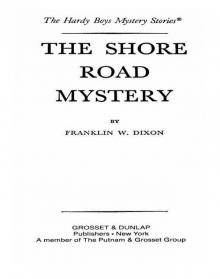 The Shore Road Mystery
The Shore Road Mystery Trouble Times Two
Trouble Times Two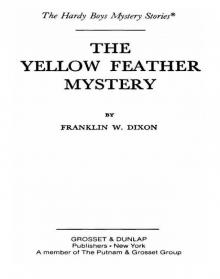 The Yellow Feather Mystery
The Yellow Feather Mystery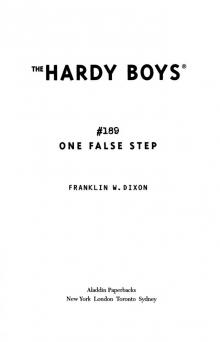 One False Step
One False Step Crime in the Cards
Crime in the Cards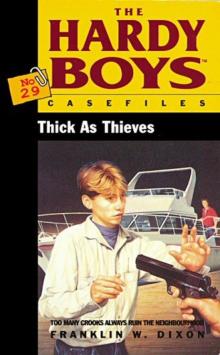 Thick as Thieves
Thick as Thieves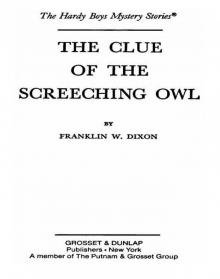 The Clue of the Screeching Owl
The Clue of the Screeching Owl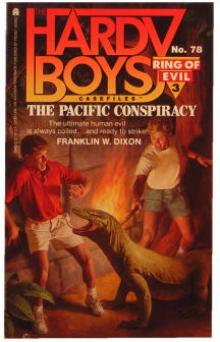 The Pacific Conspiracy
The Pacific Conspiracy The Genius Thieves
The Genius Thieves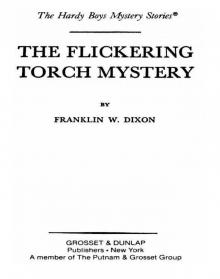 The Flickering Torch Mystery
The Flickering Torch Mystery Into Thin Air
Into Thin Air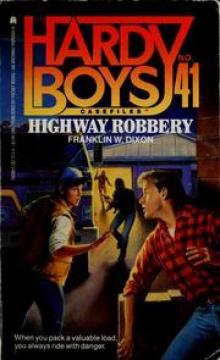 Highway Robbery
Highway Robbery Deadfall
Deadfall Mystery of the Flying Express
Mystery of the Flying Express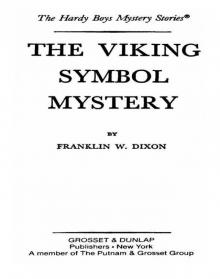 The Viking Symbol Mystery
The Viking Symbol Mystery The End of the Trail
The End of the Trail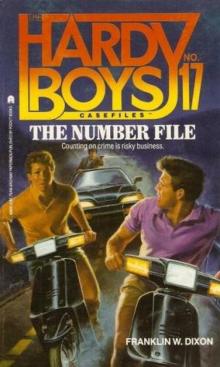 The Number File
The Number File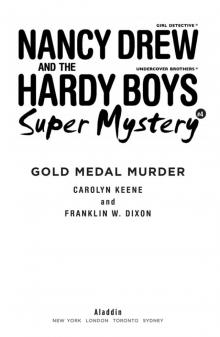 Gold Medal Murder
Gold Medal Murder Bound for Danger
Bound for Danger Collision Course
Collision Course The Madman of Black Bear Mountain
The Madman of Black Bear Mountain The Secret of the Lost Tunnel
The Secret of the Lost Tunnel The Stone Idol
The Stone Idol The Secret of Pirates' Hill
The Secret of Pirates' Hill A Con Artist in Paris
A Con Artist in Paris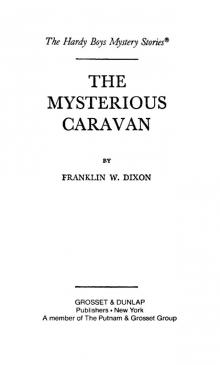 The Mysterious Caravan
The Mysterious Caravan The Secret of Sigma Seven
The Secret of Sigma Seven The Twisted Claw
The Twisted Claw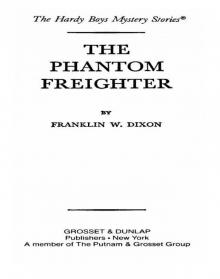 The Phantom Freighter
The Phantom Freighter The Dead Season
The Dead Season The Video Game Bandit
The Video Game Bandit The Vanishing Game
The Vanishing Game Typhoon Island
Typhoon Island